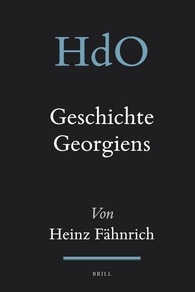

|
The Kartvelologist The Kartvelologist” is a bilingual (Georgian and English) peer-reviewed, academic journal, covering all spheres of Kartvelological scholarship. Along with introducing scholarly novelties in Georgian Studies, it aims at popularization of essays of Georgian researchers on the international level and diffusion of foreign Kartvelological scholarship in Georgian scholarly circles. “The Kartvelologist” issues both in printed and electronic form. In 1993-2009 it came out only in printed form (#1-15). The publisher is the “Centre for Kartvelian Studies” (TSU), financially supported by the “Fund of the Kartvelological School”. In 2011-2013 the journal is financed by Shota Rustaveli National Science Foundation. |
Towards the Assessment of Viceroy Mikhail Vorontsov’s Cultural-enlightenment Policy
A purposeful and planned cultural-enlightenment policy, launched with Vorontsov’s support and the decisive participation of Georgian public figures, gave rise to a process that was crowned with the creation and establishment of a national ideology, based on the world view and literary principles, clearly formulated by I. Chavchavadze (generally by the “Tergdaleulis”) in the 1860s. keywords:Vorontsov, “Caucasian policy”, Europeanization, the“Tergdaleulis”. Category: SCHOLARLY STUDIES Authors: RUSUDAN ENUKIDZE A New Book on Georgian History Heinz Fähnrich. History of Georgia
The work is written with good knowledge of the subject, scholarly, objective approach and genuine love of Georgia. In moot questions, be these ancient or recent painful issues, the author does not try to take sides, but rests on more or less widely shared views accepted in Georgian historiography, placing absolutely correct accents through his objective presentation. In the reconstruction of Georgia’s early history the author bases himself on Ancient Eastern (Assyrian, Urartian) and Classical sources. He presents the history of the subsequent period, beginning with that of the Parnavazids, mainly on the basis of “Kartlis Tskhovreba” and other important sources. It is advisable to have the work translated into Georgian. keywords:Heinz Fähnrich, Georgia Category: CHRONICLE OF EVENTS Authors: RUSUDAN ENUKIDZE Shota Rustaveli’s “The Man in the Panther Skin” in German Schools
German and Georgian Kartvelologists have hitherto not been aware of the fact that the Georgian author Rustaveli and his poem “The Man in the Panther Skin” entered a German school textbook. There is no reference to this book in the last German Bibliography (Georgia -the German-language world, 2008), though they said textbook was issued in 1985 and was used in schools of the German Democratic Republic. At the time, Rustaveli was almost unknown in the German Federal Republic. Following the unification of Germany Rustaveli was not entered in any textbook. keywords:Rustaveli, Germany, school textbook, song of the heroes. Category: CHRONICLE OF EVENTS Authors: RUSUDAN ENUKIDZE Heinz Fähnrich
Heinz Fähnrich was born in 1941, in the German village of Hamer. In 1960-1965 Fähnrich studied at Friedrich Schiller University of Jena, specializing in Caucasian Studies. From 1967 Fähnrich was engaged in doctoral studies at Ivane Javakhishvili Tbilisi State University under the supervision of Professor Akaki Shanidze. Fähnrich defended his doctoral thesis in 1965 at the University of Jena. In 1969 he was awarded the degree of Candidate of Sciences.
keywords:Heinz Fähnrich, Kartvelology Category: KARTVELOLOGISTS Authors: RUSUDAN ENUKIDZE
Two Meetings with Grigol Robakidze and Kita Chkhenkeli
In September 1961 the tour of the Georgian Folk Dance Company (directed by I. Sukhishvili and N. Ramishvili) proved especially exciting and interesting for me: in Geneva I met Grigol Robakidze, and at Lausanne Kita Chkhenkeli. Our tour in Geneva was coming to an end. In two days we were moving to Lausanne. I was told by the boy dancers that all our concerts, and even rehearsals, were attended by Grigol Robakidze. They took this fact as a matter of course, for during our tours of Europe Georgians, enthusiastic over our company’s success, often came to see us after the concert. However, tears welled up into their eyes when speaking about Georgia and their relations. I remember how angry I was with the boys for not telling me about Grigol Robakidze visiting the concerts. They assured me that he would surely come on the following day, for it was our last performance. Really, the next day, following the concert, dear Nino and I were told that Grigol was waiting for us… above average height, a thin man (you would not take him for a man over eighty), in a grey gabardine overcoat, with black glossy combed hair and astonishingly cold gimlet-eyes (I even thought that the boys’ story about tears in those eyes must have been an optical illusion). Upon greeting us, I was surprised that he made no mention of the dance and concerts; he must have thought the fortnight “spent” by him in the theatre with our company was sufficient proof of his enthusiasm. We told him that the next morning we were leaving for Lausanne. He promised to see us off at the pier (we were to cross Lake Leman). Then, all of a sudden he said that he was writing an article in response to one published by French journalists on Georgia. He said, two French journalists had travelled to Georgia and written many good things, but had concluded their impressions thus: “The Georgians, like the residents of Cannebierre Street in Marseilles (most French anecdotes are said to have been invented by them), believe that the world begins and ends in Georgia”. This conclusion made by the French journalists had got Dear Grigol’s goat and he had decided to write a reply. keywords:Grigol Robakidze, Kita Chkhenkeli Category: CHRONICLE OF EVENTS Authors: RUSUDAN ENUKIDZE |
Categories Journal Archive |




